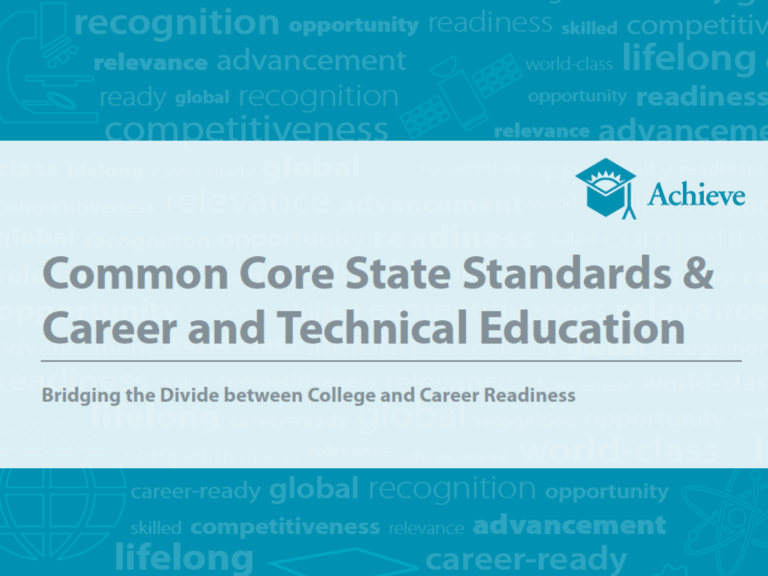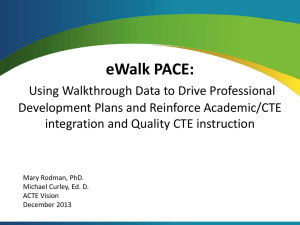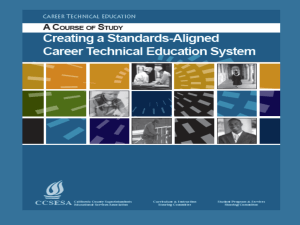CCSS-CTE ADP Webinar

Common Core State Standards & Career and
Technical Education: Bridging the Divide between College and Career Readiness
The Moment is Here and the Opportunity is Clear:
As states are working to align their education systems with the
CCSS in support of the goal of graduating all students ready for
college, careers and life, academic and CTE leaders at the state and local levels can and should maximize this opportunity to finally break down the silos between their disciplines and collectively find ways to ensure that the new standards rigorously
engage all students in both academic and CTE courses.
http://www.achieve.org/CCSS-CTE-BridgingtheDivide
Survey and General Conclusion
Survey administered November 2011
– Questions addressed plans, timetables, formation of state level teams for CCSS, role of CTE in implementing CCSS.
Conclusion?
• A substantial gap (or divide) between the need for CTE involvement and the actual level of CTE involvement.
• An implication that CCSS implementation is purely an academic initiative, despite interest from CTE leaders to be involved.
State Interviews
• Based on survey findings, eight states selected for follow-up interviews: California, Illinois, Kentucky, Mississippi, Missouri, New
Jersey, Ohio and Oregon.
• Interviews carried our in December 2011 and January 2012.
• Interviews focused on state agency activities to implement the CCSS within CTE. Did not try to assess local implementation.
• Interview findings were synthesized to identify 8 strategies that were employed.
• Not all states employed all the strategies.
• Report draft was completed in March 2012.
Strategies for Bridging the Divide
1.
Developing a Common Understanding of College and Career
Readiness
2.
Forming Cross-Disciplinary Teams for CCSS Planning and
Implementation
3.
Ramping up Communications and Information Sharing
4.
Creating or Updating Curricular and Instructional Resources
5.
Enhancing Literacy and Math Strategies within CTE Instruction
6.
Fostering CTE and Academic Teacher Collaboration
7.
Establishing Expectations for and Monitoring CCSS Integration into CTE
8.
Involving Postsecondary CTE in CCSS Implementation
Setting a New Standard for CTE
Kimberly Green, NASDCTEc Executive
Director
Reflect, Transform, Lead:
A New Vision for Career Technical
Education
• CTE is critical to ensuring that the United States leads in global competitiveness.
• CTE actively partners with employers to design and provide high-quality, dynamic programs.
• CTE prepares students to succeed in further education and careers.
• CTE is delivered through comprehensive programs of study aligned to The National Career Clusters Framework.
• CTE is a results-driven system that demonstrates a positive return on investment.
Why do we need to align the CCSS and
CTE?
• CTE is critical to ensuring that the United States leads in global competitiveness.
– Demands for relevance, increased student engagement and achievement
– A call for common standards
• CTE actively partners with employers to design and provide high-quality, dynamic programs.
– Employer involvement in setting standards
– Teaching and learning should model the real world
Why do we need to align the CCSS and
CTE?
• CTE prepares students to succeed in further education and careers.
– College readiness and career readiness for ALL
• CTE is delivered through comprehensive programs of study aligned to The National Career Clusters Framework.
– Program of study is the implementation strategy for CCSS and CTE alignment
– Achieve pilot study
Why do we need to align the CCSS and
CTE?
• CTE is a results-driven system that demonstrates a positive return on investment.
– Data-driven decision-making
– Common data elements, measures and reporting
– CTE student performance on academic measures under
Perkins is very strong
The Common Career Technical Core
Initiative
• Common Career Technical Core (CCTC):
– a state-led initiative to establish a shared set of high-quality
Career Technical Education (CTE) standards
– what students should know and be able to do at the end of a program of study within a particular career field.
• Forty-two states, the District of Columbia, and one territory--
Palau--participated in the development and validation of the
CCTC.
High Quality CTE Programs
In order for CTE programs to prepare students to be college and career ready for the global economy, CTE programs should include:
•Common Career Technical Core Standards in each of the 16
Career Cluster™ areas (CCTC)
•Career Ready Practices
•Common Core State Standards (CCSS)
Closing: CCSS and CCTC Alignment
• CCSS is critical to enhancing the academic quality of
CTE programs.
• CTE partnering with CCSS can add relevance without losing rigor.
• Leadership matters! Break down silos!
Career Readiness
Three key components:
• Academic skills
• Employability skills
• Technical skills
15
Career and Technical
Education Today
For All Students
For All “Careers”
16 Clusters – 79 Pathways
Aligns / Supports Academics
High School and
Postsecondary Partnerships
Core Academic Coursework
Career & Technical Education
Arts Education
Flagler Hospital Academy of Medical and Health Centers (St. Augus tine, FL)
• Career academy within Pedro Menendez HS
• Academic-CTE integrated curriculum
• 250 students
• Hospital staff teach some courses
• Dual enrollment options at nearby CC
• Flagler hospital provides classroom space, lab facilities, internships, teacher externships, etc.
BRIDGING THE DIVIDE:
The Ohio Perspective
Common Core State Standards & Career and
Technical Education: Bridging the Divide between College and Career Readiness
For more information, contact Kate Blosveren: kblosveren@achieve.org
/ 202-419-1551 www.achieve.org/CCSS-CTE-BridgingtheDivide








